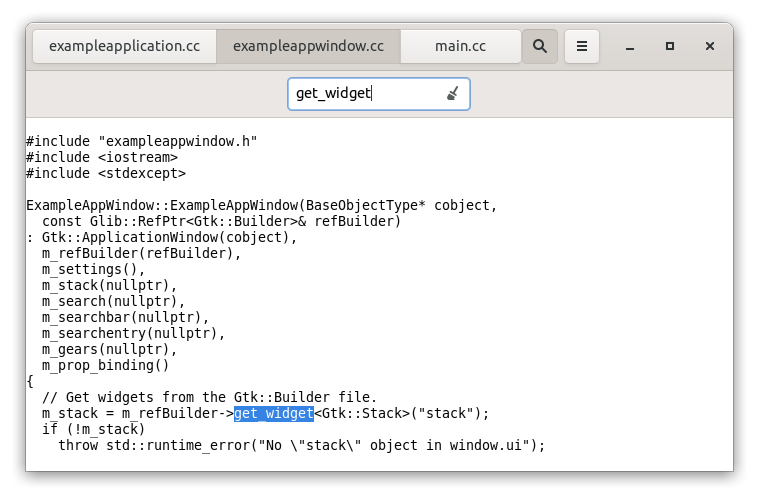Adding a search bar
We continue to flesh out the functionality of our application. For now, we add search. gtkmm supports this with Gtk::SearchEntry and Gtk::SearchBar. The search bar is a widget that can slide in from the top to present a search entry.
We add a toggle button to the header bar, which can be used to slide out the search bar below the header bar. The new widgets are added in the window.ui file.
Implementing the search needs quite a few code changes that we are not going to completely go over here. The central piece of the search implementation is a signal handler that listens for text changes in the search entry, shown here without error handling.
void ExampleAppWindow::on_search_text_changed()
{
const auto text = m_searchentry->get_text();
auto tab = dynamic_cast<Gtk::ScrolledWindow*>(m_stack->get_visible_child());
auto view = dynamic_cast<Gtk::TextView*>(tab->get_child());
// Very simple-minded search implementation.
auto buffer = view->get_buffer();
Gtk::TextIter match_start;
Gtk::TextIter match_end;
if (buffer->begin().forward_search(text, Gtk::TextSearchFlags::CASE_INSENSITIVE,
match_start, match_end))
{
buffer->select_range(match_start, match_end);
view->scroll_to(match_start);
}
}
With the search bar, our application now looks like this:
File: exampleapplication.h (For use with gtkmm 4)
#include "../step4/exampleapplication.h" // Equal to the corresponding file in step4
File: exampleappprefs.h (For use with gtkmm 4)
#include "../step5/exampleappprefs.h" // Equal to the corresponding file in step5
File: exampleappwindow.h (For use with gtkmm 4)
#ifndef GTKMM_EXAMPLEAPPWINDOW_H_
#define GTKMM_EXAMPLEAPPWINDOW_H_
#include <gtkmm.h>
class ExampleAppWindow : public Gtk::ApplicationWindow
{
public:
ExampleAppWindow(BaseObjectType* cobject,
const Glib::RefPtr<Gtk::Builder>& refBuilder);
static ExampleAppWindow* create();
void open_file_view(const Glib::RefPtr<Gio::File>& file);
protected:
// Signal handlers
void on_search_text_changed();
void on_visible_child_changed();
Glib::RefPtr<Gtk::Builder> m_refBuilder;
Glib::RefPtr<Gio::Settings> m_settings;
Gtk::Stack* m_stack;
Gtk::ToggleButton* m_search;
Gtk::SearchBar* m_searchbar;
Gtk::SearchEntry* m_searchentry;
Gtk::MenuButton* m_gears;
Glib::RefPtr<Glib::Binding> m_prop_binding;
};
#endif /* GTKMM_EXAMPLEAPPWINDOW_H */
File: main.cc (For use with gtkmm 4)
#include "../step5/main.cc" // Equal to the corresponding file in step5
File: exampleappwindow.cc (For use with gtkmm 4)
#include "exampleappwindow.h"
#include <iostream>
#include <stdexcept>
ExampleAppWindow::ExampleAppWindow(BaseObjectType* cobject,
const Glib::RefPtr<Gtk::Builder>& refBuilder)
: Gtk::ApplicationWindow(cobject),
m_refBuilder(refBuilder),
m_settings(),
m_stack(nullptr),
m_search(nullptr),
m_searchbar(nullptr),
m_searchentry(nullptr),
m_gears(nullptr),
m_prop_binding()
{
// Get widgets from the Gtk::Builder file.
m_stack = m_refBuilder->get_widget<Gtk::Stack>("stack");
if (!m_stack)
throw std::runtime_error("No \"stack\" object in window.ui");
m_search = m_refBuilder->get_widget<Gtk::ToggleButton>("search");
if (!m_search)
throw std::runtime_error("No \"search\" object in window.ui");
m_searchbar = m_refBuilder->get_widget<Gtk::SearchBar>("searchbar");
if (!m_searchbar)
throw std::runtime_error("No \"searchbar\" object in window.ui");
m_searchentry = m_refBuilder->get_widget<Gtk::SearchEntry>("searchentry");
if (!m_searchentry)
throw std::runtime_error("No \"searchentry\" object in window.ui");
m_gears = m_refBuilder->get_widget<Gtk::MenuButton>("gears");
if (!m_gears)
throw std::runtime_error("No \"gears\" object in window.ui");
// Bind settings.
m_settings = Gio::Settings::create("org.gtkmm.exampleapp");
m_settings->bind("transition", m_stack->property_transition_type());
// Bind properties.
m_prop_binding = Glib::Binding::bind_property(m_search->property_active(),
m_searchbar->property_search_mode_enabled(), Glib::Binding::Flags::BIDIRECTIONAL);
// Connect signal handlers.
m_searchentry->signal_search_changed().connect(
sigc::mem_fun(*this, &ExampleAppWindow::on_search_text_changed));
m_stack->property_visible_child().signal_changed().connect(
sigc::mem_fun(*this, &ExampleAppWindow::on_visible_child_changed));
// Connect the menu to the MenuButton m_gears.
// (The connection between action and menu item is specified in gears_menu.ui.)
auto menu_builder = Gtk::Builder::create_from_resource("/org/gtkmm/exampleapp/gears_menu.ui");
auto menu = menu_builder->get_object<Gio::MenuModel>("menu");
if (!menu)
throw std::runtime_error("No \"menu\" object in gears_menu.ui");
m_gears->set_menu_model(menu);
}
//static
ExampleAppWindow* ExampleAppWindow::create()
{
// Load the Builder file and instantiate its widgets.
auto refBuilder = Gtk::Builder::create_from_resource("/org/gtkmm/exampleapp/window.ui");
auto window = Gtk::Builder::get_widget_derived<ExampleAppWindow>(refBuilder, "app_window");
if (!window)
throw std::runtime_error("No \"app_window\" object in window.ui");
return window;
}
void ExampleAppWindow::open_file_view(const Glib::RefPtr<Gio::File>& file)
{
const Glib::ustring basename = file->get_basename();
auto scrolled = Gtk::make_managed<Gtk::ScrolledWindow>();
scrolled->set_expand(true);
auto view = Gtk::make_managed<Gtk::TextView>();
view->set_editable(false);
view->set_cursor_visible(false);
scrolled->set_child(*view);
m_stack->add(*scrolled, basename, basename);
auto buffer = view->get_buffer();
try
{
char* contents = nullptr;
gsize length = 0;
file->load_contents(contents, length);
buffer->set_text(contents, contents+length);
g_free(contents);
}
catch (const Glib::Error& ex)
{
std::cout << "ExampleAppWindow::open_file_view(\"" << file->get_parse_name()
<< "\"):\n " << ex.what() << std::endl;
return;
}
auto tag = buffer->create_tag();
m_settings->bind("font", tag->property_font());
buffer->apply_tag(tag, buffer->begin(), buffer->end());
m_search->set_sensitive(true);
}
void ExampleAppWindow::on_search_text_changed()
{
const auto text = m_searchentry->get_text();
if (text.empty())
return;
auto tab = dynamic_cast<Gtk::ScrolledWindow*>(m_stack->get_visible_child());
if (!tab)
{
std::cout << "ExampleAppWindow::on_search_text_changed(): No visible child." << std::endl;
return;
}
auto view = dynamic_cast<Gtk::TextView*>(tab->get_child());
if (!view)
{
std::cout << "ExampleAppWindow::on_search_text_changed(): No visible text view." << std::endl;
return;
}
// Very simple-minded search implementation.
auto buffer = view->get_buffer();
Gtk::TextIter match_start;
Gtk::TextIter match_end;
if (buffer->begin().forward_search(text, Gtk::TextSearchFlags::CASE_INSENSITIVE,
match_start, match_end))
{
buffer->select_range(match_start, match_end);
view->scroll_to(match_start);
}
}
void ExampleAppWindow::on_visible_child_changed()
{
m_searchbar->set_search_mode(false);
}
File: exampleappprefs.cc (For use with gtkmm 4)
#include "../step5/exampleappprefs.cc" // Equal to the corresponding file in step5
File: exampleapplication.cc (For use with gtkmm 4)
#include "../step5/exampleapplication.cc" // Equal to the corresponding file in step5
File: window.ui (For use with gtkmm 4)
<?xml version="1.0" encoding="UTF-8"?>
<interface>
<object class="GtkApplicationWindow" id="app_window">
<property name="title" translatable="yes">Example Application</property>
<property name="default-width">600</property>
<property name="default-height">400</property>
<property name="hide-on-close">True</property>
<child type="titlebar">
<object class="GtkHeaderBar" id="header">
<child type="title">
<object class="GtkStackSwitcher" id="tabs">
<property name="stack">stack</property>
</object>
</child>
<child type="end">
<object class="GtkMenuButton" id="gears">
<property name="direction">none</property>
</object>
</child>
<child type="end">
<object class="GtkToggleButton" id="search">
<property name="sensitive">False</property>
<property name="icon-name">edit-find-symbolic</property>
</object>
</child>
</object>
</child>
<child>
<object class="GtkBox" id="content_box">
<property name="orientation">vertical</property>
<child>
<object class="GtkSearchBar" id="searchbar">
<child>
<object class="GtkSearchEntry" id="searchentry">
</object>
</child>
</object>
</child>
<child>
<object class="GtkStack" id="stack">
<property name="transition-duration">500</property>
</object>
</child>
</object>
</child>
</object>
</interface>

